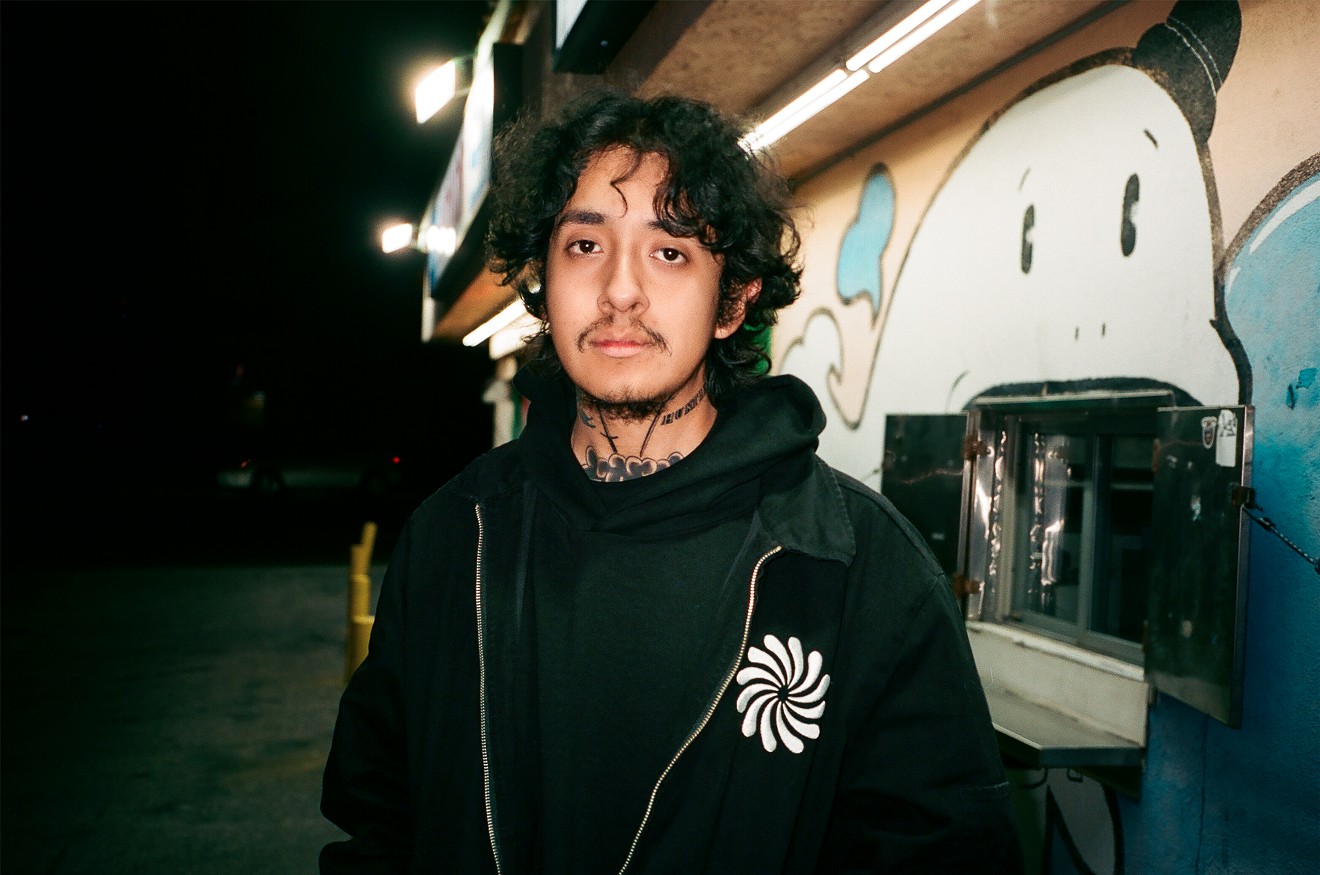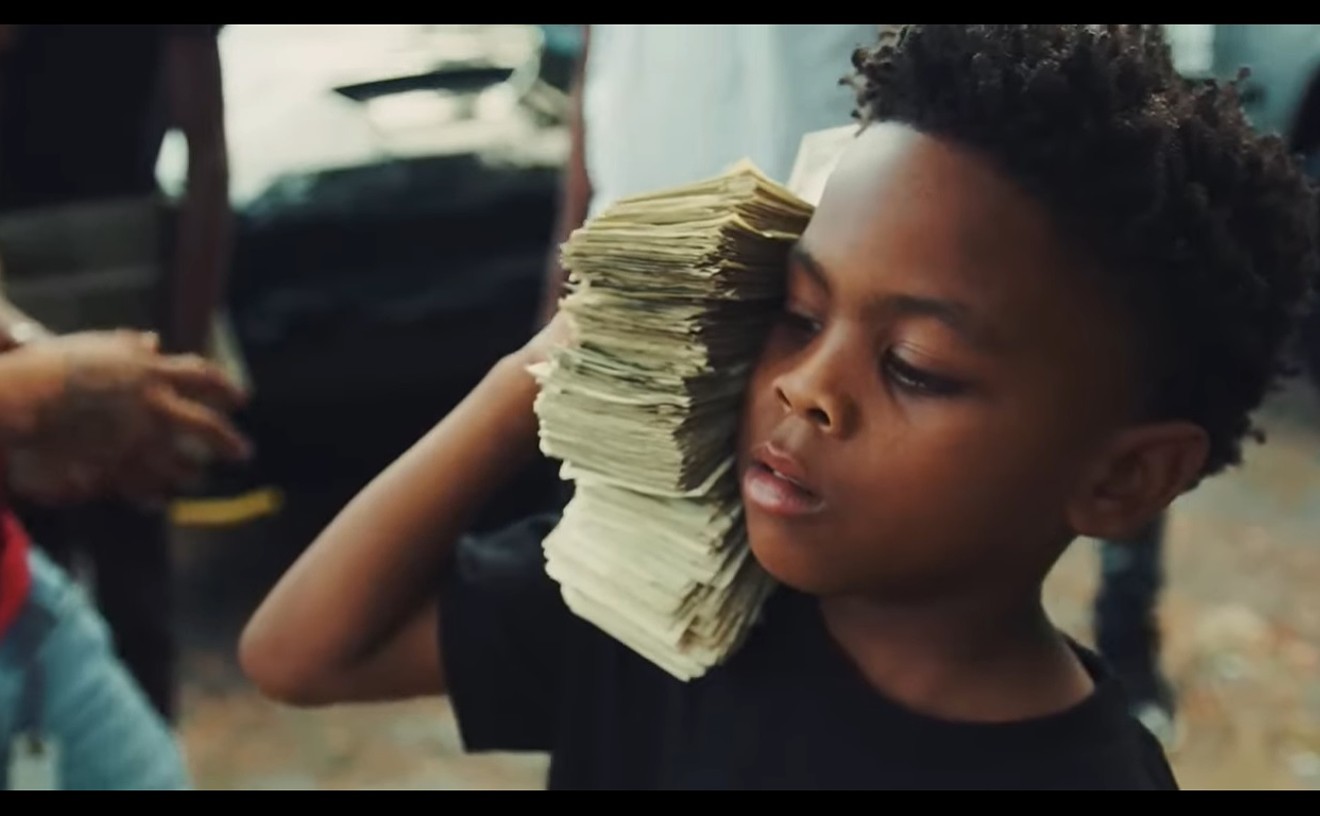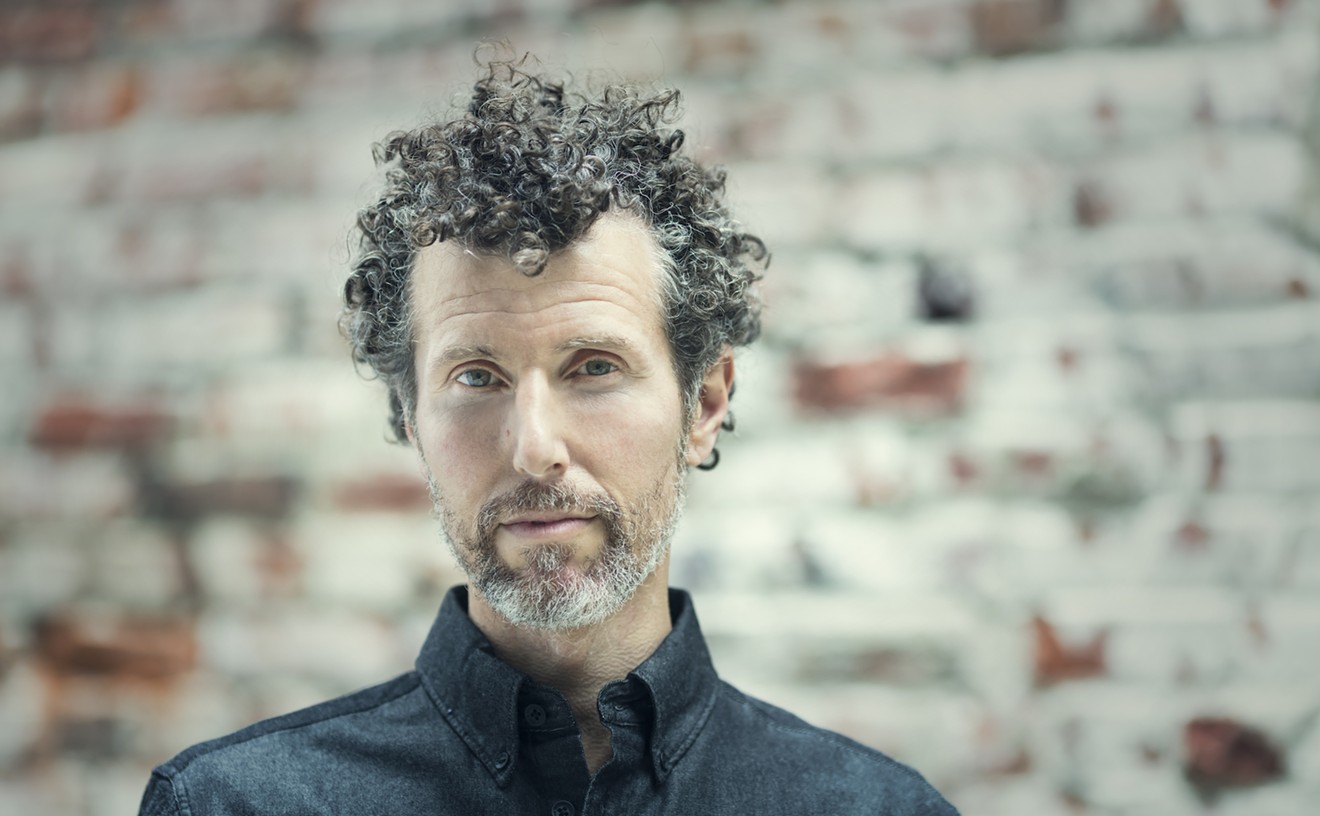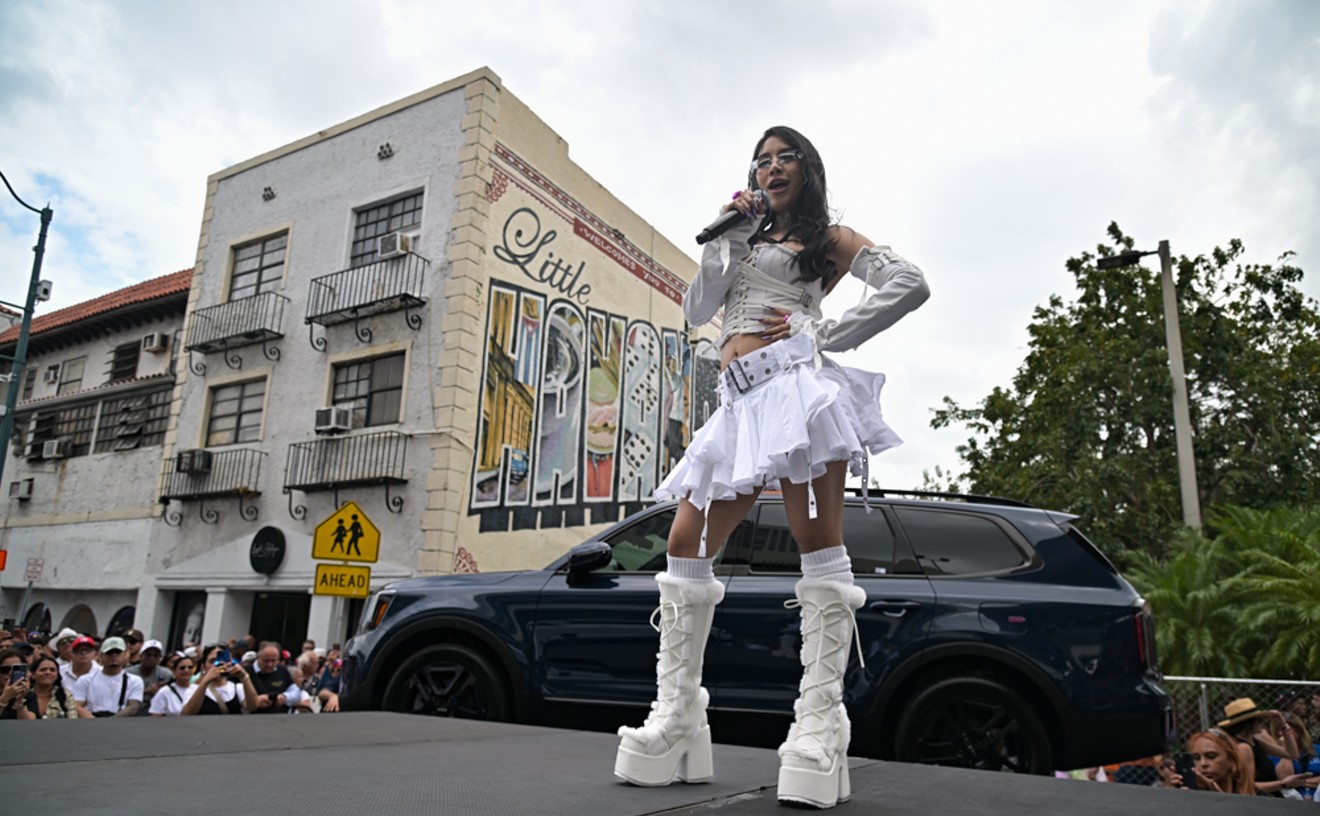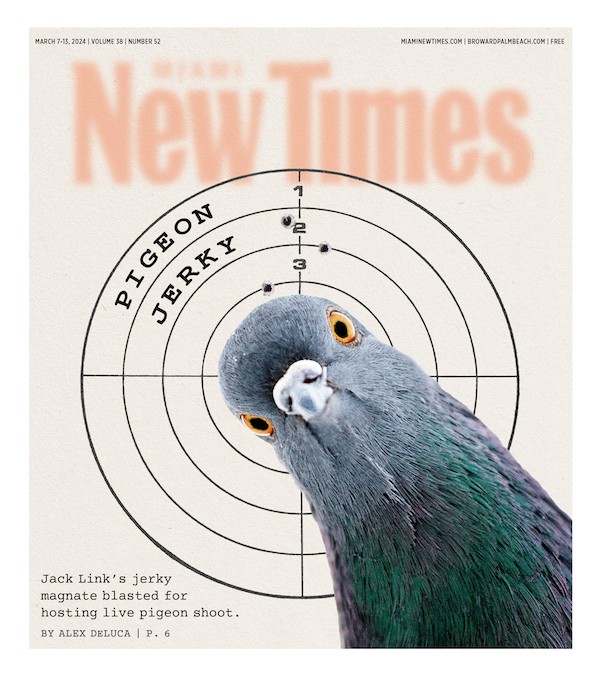Before he was known as Cuco by millions of Gen Z fans, Omar Banos started winning over listeners of all ages with his faithful slide-guitar cover of "Sleep Walk" on YouTube.
"I've always liked oldies," the 25-year-old Chicano singer and multi-instrumentalist tells New Times. "Growing up on the outskirts of L.A., you hear a lot of those kinds of songs. You always see lowrider culture, and when you see the lowriders, a lot of times they're playing hella oldies. It's something you kind of just catch on to if you grow up out here."
Indeed, its appreciation for vintage tuneage is an integral and cherished aspect of Chicano culture, with elders passing down to younger family members their love for mid-20th century genres like doo-wop, rhythm & blues, and the pioneering Chicano rock of Ritchie Valens, Thee Midniters, and Cannibal & the Headhunters. The songs of this era often evoke a nostalgic connection to the past, resonating with Mexican-Americans who are deeply rooted in their cultural history and traditions.
With his catchy melodic hooks and saccharine falsetto crooning about lost love, Banos' penchant for the melancholic songcraft of yesteryear is more than evident throughout the Cuco discography. But then, it wouldn't be Cuco if he wasn't also heavily steeped in música en español.
"Mexican and Hispanic music has been around me my whole life," he says. “Cumbia romántica, norteñas, salsa, mambo. I grew up listening to everything because, one way or another, I was going to get to it through my parents or my friends' families listening to something. Definitely Juan Gabriel, Los Panchos, and Vicente Fernandez.”
Banos didn't need to prove his reverence for Latin music to anyone, but he did it anyway in 2020 with a charming trap beat cover of "Piel Canela," a classic Puerto Rican bolero by Bobby Capó from 1953, which Julio Iglesias and Nat King Cole have also covered. (The latter sang the Spanish lyrics phonetically.)
When it comes to more contemporary Hispanic musical influences, Banos immediately namechecks Lil Rob and MC Magic, and with reason. The two Chicano rap legends have played no small part in normalizing Spanglish in American recorded music since the 1990s. Banos would enjoy a fanboy moment in 2019 when he collaborated with both of his childhood idols on the single "Search."
Spanglish, of course, is not only one of the defining idiosyncrasies of Banos' songwriting but also the reason this young talent is so emblematic of America's increasingly multicultural zeitgeist.
When Ritchie Valens released his rock 'n' roll version of the Mexican folk song "La Bamba" in 1958, he introduced mainstream American audiences to Spanish-language music they could relate to for the first time. Fast-forward six decades, and Banos is doing his generation the same invaluable service in Spanglish, the language of his multicultural American identity. "Lo Que Siento," one of his most whimsical, post-ironic takes on the classic love song formula, alternates seamlessly between English and Spanish verses. The song has been streamed more than 300 million times on Spotify.
"When I'm talking to the homies, I always end up throwing Spanglish in there. Same with writing songs," he explains. "It's just one of those things that make sense if it works naturally."
"I just think it sounds awesome," he adds. "I definitely like to practice my Spanish a lot by just speaking with my family, my homies from across the border, and those who aren't Mexican, like from Venezuela, Puerto Rico, Colombia — all the different accents and all the slang. I think it's really beautiful."
Spanish-language music has never been bigger in the United States than it is today. The Recording Industry Association of America reports that U.S. Latin music revenues in 2022 exceeded $1 billion for the first time and grew significantly faster than the overall market.
"A lot of Mexicans are taking over right now," Banos proudly points out. "Like, you can't go anywhere and not hear Peso Pluma, Fuerza Regida, DannyLux, and all that type of stuff. It's sick seeing how they're putting it on for the culture. It's a movement not just for Mexicans, but for a lot of people of color making all these moves and becoming real empowered.""When I'm talking to the homies, I always end up throwing Spanglish in there. Same with writing songs."
tweet this
"I don't think about it too much because, for me, I'm just doing me," he admits. "But in the back of my head, I know I'm also representing Chicanos, and I'm happy to be representing in my own way."
On October 8, 2018, Cuco fans came close to experiencing their generation's own "Day the Music Died" of sorts after a horrific tour van accident almost took Banos' life. The band and crew — a total of ten — were heading eastbound on the I-40 toward Nashville when the vehicle skidded out of control, toppled over, and was subsequently hit by an incoming semitrailer, grievously injuring most of the passengers. Banos was hospitalized following surgery to insert 13 screws and a rod into his left leg.
Unlike the great, late Ritchie Valens, Banos, fortunately, remains with us, and the music lives. In fact, the accident had a profoundly revitalizing effect on the music. Fantasy Getaway, his latest album from 2022, is clearly the work of a more mature artist who has graduated from writing precious love songs to grappling with his mortality and the weight of the world.
"I think some of the more existential stuff probably goes back to that situation because the perspective I had before and after the accident definitely wasn't the same," he says. "How to appreciate life and how huge sometimes things feel, but in the greater scheme of things, everything is pretty minuscule. Even down the line, just learning that you're still going to continue to change."
"Fantasy Gateway has a recurring theme for me, which is growth," he explains. "Growth is forever; I never stop saying that. Life is fragile, and circumstances in your life are going to be volatile. It shifts up and down, and anything can go north or south. It makes other things not even matter at that moment."
He adds, "I'm never going to stop changing and growing, so the music's going to keep changing, the sound's going to keep changing. Thankfully, my formula is not something I've mapped out."
"My next release is coming out very soon, within the next couple of months," he discloses. "It's a more psychedelic, existential journey. But I think it's a project that will explain itself very well."
Cuco. 8 p.m. Thursday, October 19, at Miami Beach Bandshell, 7275 Collins Ave., Miami Beach; miamibeachbandshell.com. Tickets cost $57.31 via dice.fm.

